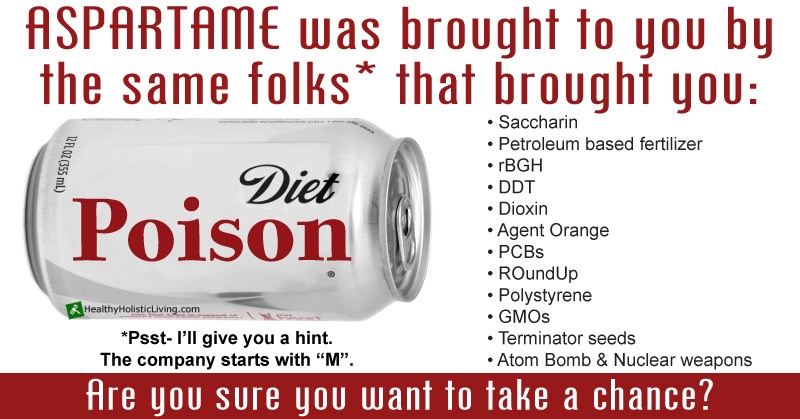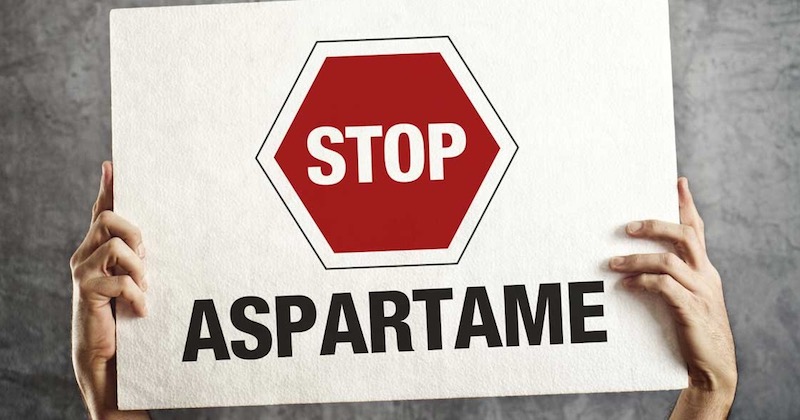The Spin On Aspartame: The Truth We're Not Being Told
Last updated on
There’s more than enough information, research, and speculation out there on the subject to fill encyclopedias, and this article only briefly outlines the subject. We wanted to focus on a small part of the debate:
We wanted to look at the folks who keep telling us that it’s safe: the so called ‘experts’. Experts in the government, medical field, the people who keep patting us on the head and telling us not to worry, that if aspartame was dangerous, they’d tell us.
Being skeptics has never helped. The more someone pats you on the head, the more you start looking for something up their sleeve.
Let us be clear: We have been deceived about the safety of a dangerous product, and all in the name of corporate profits.
Before you read on, check out this video:
Where Did Aspartame Come From?
It was first developed by the pharmaceutical company G.D. Searle. But Searle had difficulty getting their product approved by the Food and Drug Administration, the federal agency responsible for making sure our food and drugs are safe: Apparently, the monkeys and mice that the substance was tested on, developed brain lesions, tumors, and seizures, and even died from it.
The company’s applications for approval were rejected for 16 years, but they persisted in offering their “proof” that aspartame was safe until the FDA finally asked the Department of Justice to prosecute G.D. Searle for submitting fraudulent test data in their efforts to get the substance approved. (An FDA senior toxicologist, Dr. Adrian Gross, once told Congress, “Beyond a shadow of a doubt aspartame triggers brain tumors.”)
When it looked like aspartame would be approved later on for use in carbonated beverages, the National Soft Drink Association itself objected, saying it wouldn’t be safe because aspartame is very unstable in liquid form and breaks down into, among other things, formaldehyde.
Monsanto bought G.D. Searle and Co. in 1985, and the NutraSweet Company operated as part of Monsanto until 2000, when Monsanto sold it to J.W. Childs Equity Partners, where it remains today.
And in all this time, the FDA has compiled a list of 92 symptoms associated with aspartame consumption, including nausea, dizziness, blindness, deafness, weight gain, and even death. And aspartame is still here, and it’s showing up in more and more products.
In fact, the Aspartame Resource Center, at aboutaspartame.com, notes that it is found in more than 6,000 products worldwide. And they should know: the Aspartame Resource Center is actually a public relations and “information” arm of Ajinomoto, one of the world’s largest producers of aspartame, the other being the NutraSweet Company. (Ajinomoto is also known for its other additive, monosodium glutamate, or MSG.)
The ARC site is full of cheerful information on the safety of aspartame, and they even have a section labeled “Meet the doctors,” which lists their “medical advisory board.”
In that section, the ARC says, “The Aspartame Information Center Expert Medical Advisory Board was created to help guide the Center’s communications to health professionals and the public about aspartame benefits, safety and role in a healthy diet.
The board members provide counsel on current medical and nutrition science, as well as insight on tools that help address the needs of health professionals in their work. Their backgrounds span critical areas of medicine and science, and each has unique experience in health and nutrition.”
How To Know If A Product Contains Aspartame
The Aspartame Resource Center says simply looking at the ingredient list will tell you if the product contains aspartame, and indeed, the FDA requires that aspartame be listed on the label. Right, that ARC, that FDA. But just in case a company hasn’t listed it, if the label mentions “phenylalanine” at all, which is a component of aspartame, then the product contains aspartame.
But you’ll need to be vigilant, especially given the tiny print on most ingredient labels. And given the propensity of aspartame to turn up where you least expect it, such as in the vitamins you give to your child, or your liquid antibiotics, or your Metamucil.
The bottom line is, your vigilance is the only thing standing between you and your unwilling ingestion of a dangerous product. Our government and our medical experts are in the very deep pockets of the industry that makes and sells that dangerous product, and no help is going to come from them. None.
Some of the links I post on this site are affiliate links. If you go through them to make a purchase, I will earn a small commission (at no additional cost to you). However, note that I’m recommending these products because of their quality and that I have good experience using them, not because of the commission to be made.



































 JOIN OVER
JOIN OVER
Comments